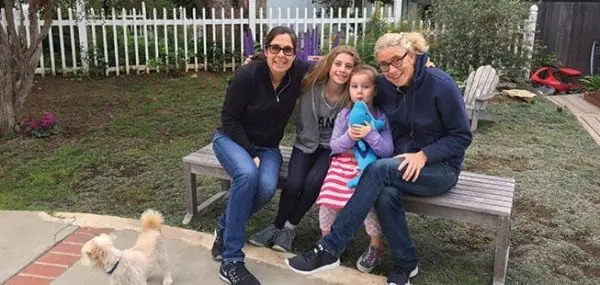Inevitably, within a few minutes of seeing our teenagers at the end of the day, the question comes: “What’s for dinner?” Your Teen talked to Michael Ruhlman, author of more than a dozen books about the art of cooking—and dad to two teenagers—about how he turned a passion for cooking into a career . . . and why family dinner is easier than you think. (Try Ruhlman’s Easy Chicken Curry recipe.)
Interview with Michael Ruhlman
Q: Writer? Cook? What are you?
Ruhlman: I’m a writer, first and foremost. That’s really who I am. I just happen to write a lot about food and cooking.
Q: You started cooking in fourth grade? Why?
Ruhlman: I was hungry.
Q: Sure, but a lot of fourth graders would just grab a snack. Or, ask mom or dad.
Ruhlman: My parents both worked, so when I got home from school, if I wanted something to eat, I had to make it. There’s only so many toasted bagels, ice cream, and Space Food Sticks a 10-year-old can stomach. So one day, I cooked something, and I liked it. A potato frittata someone had told me about or that I’d seen on TV. It was so good that I just kept on cooking.
Q: Yum… Dud your parents cook?
Ruhlman: Yes, and we often cooked dinner together. My mom could raise the making of a Béarnaise sauce to the level of sport. We knew the more butter you got into it, the better it was. But if you put in too much, it would break and be awful. We had no idea why it broke, only that it could. So it was like a boxing match: Béarnaise vs. Mom & Me. For me, cooking brings good memories of hanging out with my folks. And, I just kept cooking. I cooked in college (at Duke University) and when I moved to New York City to take a job as a copyboy at the New York Times. So, I’ve always cooked.
Q: You’ve made a life out of your passion, in your case for writing and cooking. Any advice on how to do that?
Ruhlman: I got lucky.
Q: Perhaps, but you worked hard too.
Ruhlman: I also showed up – that’s the other 90 percent. If you don’t show up, you’re not going to get anything.
Q: Can you give us an example?
Ruhlman: While I was working as a copyboy, I knew what I had to do to become a writer. So, I wrote a novel. That got me an agent but not a book deal. But the agent got a deal on a non-fiction book on Cleveland’s University School. For my second book, I thought, ‘Why don’t I go to culinary school?’ This was 1995, the Food Network was brand new, people were interested in chefs, and I still liked to cook. I said, ‘I’ll go to the best school in the country – the Culinary Institute of America – and see what you need to know to be a chef.’ But, I quickly realized that you couldn’t know what it meant to be a professional cook unless you become one.
So, through a weird act of providence, I was looking for a cook’s job in Cleveland to make money and learn about the work after writing the book about cooking school, and I went to see a chef named Susie Heller, who owned a restaurant out in Bainbridge, Ohio. I thought she could connect me with a really good chef in Cleveland, but instead she connected me with a really good chef in California, Thomas Keller. Two weeks later, I started writing the French Laundry Cookbook.
Q: Wow. The French Laundry is one of the most famous restaurants in the world.
Ruhlman: Yes. I had this culinary education, a love of cooking, the ability to report and write a story… and I was sent out to The French Laundry for no good reason. I hadn’t written anything nationally. I was completely unknown. And, I just went and did it.
Q: Like you say, you showed up. You have two teenagers?
Ruhlman: I have a 17-year-old daughter, who’s going to college next year, and a 13-year-old son in eighth grade. We’ve always cooked. The one time that has been sacred here is dinner (at least to me, my daughter has always resisted it, but I insist). We sit down to a family dinner every night that we can.
Q: Family dinner is a great way to stay connected.
Ruhlman: Yes. It’s good for everyone. Just having good smells in the kitchen is good for stress levels. it relaxes people. Good food makes our bodies healthy. And when we share meals together we talk to one another. We tell stories about our day, and we talk about issues. We don’t talk about school. We realized quickly that’s the one thing we should not talk about–so I never say, “You need to work harder in math or things like that.”
Q: Why?
Ruhlman: Why talk about something unpleasant when you’re enjoying a meal together?
Q: Many families have a hard time pulling off family dinner. What works for you?
Ruhlman: Start by being organized. People say, ‘I’m too busy to cook.’ But, I never hear people say, ‘I’m too busy to take a shower.’ We just make it a part of our day and that takes some planning. If you’re getting home at six o’clock and you don’t have time to make dinner, then figure out when you can make dinner. Make it in the morning or make it the night before. Or, make it on the weekend and put it in the freezer and heat it up on the stove top. It’s not hard to make a meat sauce and some spaghetti, for example. Add a salad, and you’ve got a healthy meal.
Q: What other kinds of meals work for busy families?
Ruhlman: On my blog, there is a curry recipe from my friend, Blake, who wants to make decent food for his family and wants to do it quickly. So, I created a curry that’s fast and delicious (see recipe below). Stir fry is also great. Everything can be cut up well in advance and stir fried while the rice cooks. You’ve got dinner in 20 minutes. Cut up your meat and vegetables and have your seasonings together. Meat, vegetable, sauce: it’s easy. Eggs are another great, nourishing food. Do a quick stir fry and put a fried egg on top, and it’s a killer meal. Another tip: When you make a stew or spaghetti sauce, make a double batch and freeze it.
Q: Are your teenagers picky eaters?
Ruhlman: My daughter was picky and remains picky, though she loves stir fry and Sriracha sauce so much she’s begun cooking her own stir fries. I try to find stuff she likes and make that. I’ll do two nights of stuff she loves, two nights of stuff my son loves. But basically, I say: Here’s the food, you can eat it or not. I used to make three separate dinners when they were young, but I know how to cook and like it so I could do it.
Q: And if your children didn’t eat what you made?
Ruhlman: I didn’t have a peanut butter and jelly option or anything like that. Sometimes, my daughter wouldn’t eat. She would sit with us while we ate, or she’d leave because she didn’t like what we were eating. My philosophy all along has been: Make good, healthy food available, and children’s bodies will tell them what’s good for them or what’s not (like her current vegetable stir fries – gone, strangely is the microwave popcorn). Have them taste stuff. Tell them, ‘You’ve got to taste.’ But, our bodies are naturally designed to want stuff that’s good for us. Processed food just confuses us.
Q: Do you use any processed food?
Ruhlman: Pretty much everything is from scratch. I used a can of crushed tomatoes as a base for the meat sauce I’m making tonight. But, I’ll chop up onion and carrot and cook that, then add the tomatoes and brown the beef. I use bottled salad dressing if I’m running behind. Also, I’m lucky. I can cook in my spare time because I work at home. Maybe my next book will be about strategies for cooking when you’re a busy family.




